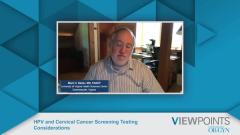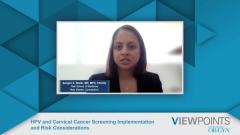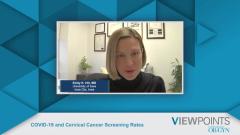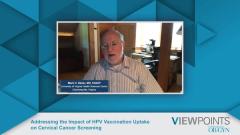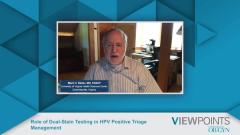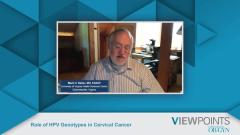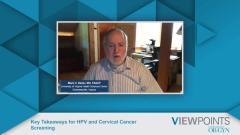
HPV and Cervical Cancer Screening Implementation and Risk Considerations
Drs Emily K. Hill, Sangini S. Sheth, and Mark H. Stoler, comment on the implementation considerations surrounding HPV and cervical cancer screening.
Episodes in this series

Dr Thomas C Wright Jr: One of the things I'd just like to add to this discussion is that in the ATHENA trial, which was the first HPV [human papillomavirus] primary screening trial run in the United States, we found a lot of high-grade disease in women 25 to 29 years of age. In fact, there were worse CIN 2 and CIN 3 lesions in that age group than there were in women over the age of 40 combined, and half of the precancers were missed by cytology in the 25 to 29 age group. There was a lot of discussion at the FDA panel meeting about whether we should accept that you can use HPV for primary screening in that age group. The panel decided that due to the large burden of disease and the poor performance of cytology in that age group, it would be an acceptable approach. I certainly understand all the issues about complexity and high rates of HPV positivity in the younger age group. Dr Sheth, what would you add to this discussion?
Dr Sangini S. Sheth: I think it's just to point out that the primary HPV screening algorithm does incorporate triage of a positive HPV result. Currently, that algorithm, the triage is actually with cytology. We may discuss it later. There are other options on the table. Also, cytology triage as well as genotyping triage partial genotyping. That can help improve the specificity as Dr Hill was pointing out the specificity concerns with primary HPV screening. Otherwise, I think that we just have to work through the implementation issues, and we need our various institutions whether it's insurance or a lot of the quality metrics also need to change how they measure that cervical cancer screening has been performed to include primary HPV screening as an acceptable modality. As those institutions change, then we will see I hope in this country, primary HPV screening also change.
Dr Thomas C Wright Jr: Certainly, in the New York area ever since the American Cancer Society guidelines came out, what we've seen is that people have begun cotesting at age 25. They heard, “Do HPV screening beginning at age 25?” They said, “Well, I'm not going to do primary screening right now, but they have adopted cotesting, which may be the worst of all worlds.” Dr Stoler, do you want to comment?
Dr Mark H. Stoler: I do want to comment. I have a couple of comments sort of overall on the discussion. The first was just alluded to. When we talk about primary HPV and the concerns about specificity, particularly in young women, besides the data that you brought up about ATHENA and the poor performance of cytology in women 25 to 29, we should really emphasize to the listener or the viewer that primary HPV does not mean just HPV. Primary HPV means do the test and then apply an appropriate triage test to the positives. It's that triage test, as I'm sure we're going to talk about, that brings the specificity and the performance that you're looking for so that you're not sending every woman in her 20s to colposcopy; you're sending the right women in her 20s to get a coloscopy. It's the data that has now been published in several clinical trials in the United States as well as around the world that show that doing the cotest doesn't get you much compared to primary HPV; this means, do a good HPV test, and then a very good triage test. It's not just testing for HPV. The other thing is the meaning of an HPV test. These HPV tests are not screening for HPV alone. They're designed to say, if you have this HPV, you have this risk of having precancer or cancer. For instance, the big surprise from ATHENA and subsequently confirmed in other studies is women with a normal Pap smear who are high-risk HPV16+ have a 10% to 20% chance of having CIN 3 even though their Pap smear is normal. It's that kind of power that really is pushing the adoption of primary HPV.
TRANSCRIPT EDITED FOR CLARITY
Newsletter
Get the latest clinical updates, case studies, and expert commentary in obstetric and gynecologic care. Sign up now to stay informed.


